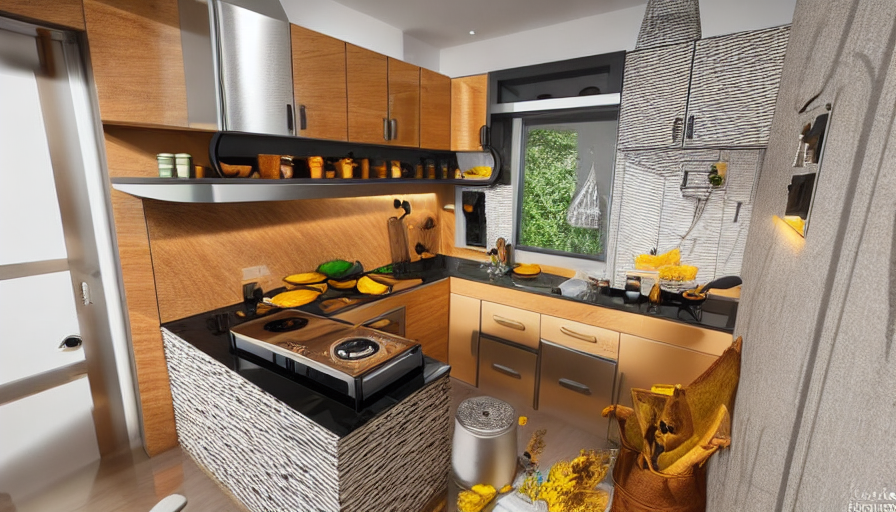
Revolutionizing Modern Cooking: AI-Powered Kitchen Design
In the ever-evolving world of home design, technology plays a pivotal role in shaping our living environments to be more efficient, accessible, and customized. At the forefront of this revolution is AI kitchen design, a cutting-edge concept that integrates artificial intelligence technologies into the heart of the home—the kitchen. This transformative approach not only enhances the functionality of kitchen spaces but also tailors them to the unique lifestyles and needs of individuals. Here’s how AI is reshaping kitchen design and why it might just be the future of culinary spaces.
What is AI Kitchen Design?
AI Kitchen Design refers to the use of artificial intelligence technologies to create smarter, more adaptive kitchen environments. These intelligent kitchens are equipped with various AI-powered appliances and systems that learn from and adapt to users’ habits and preferences to optimize functionality and efficiency.
Key Features of AI-Powered Kitchens
- Smart Appliances: From refrigerators that track food inventory and suggest recipes based on what’s available, to ovens that adjust cooking times and temperatures based on the dish.
- Voice-Activated Technology: Integration with AI assistants like Alexa or Google Home, allowing for voice commands to control kitchen functions, set timers, or even get recipe help.
- Predictive Technology: Appliances that learn from your habits, predicting your needs and helping to streamline your cooking routines.
- Energy Efficiency: AI algorithms that manage energy consumption effectively, reducing waste and saving money.
Benefits of AI Kitchen Design
The integration of AI into kitchen design brings several significant benefits that enhance the culinary experience and streamline kitchen management.
Enhanced Efficiency and Convenience
AI kitchens are designed to make cooking and kitchen management as effortless as possible. AI technologies can suggest quick and nutritious recipes based on the time of day or what’s left in your fridge, help manage your grocery list, and even order supplies directly from your local grocery store.
Personalized Cooking Experiences
Every home chef has their own preferences and dietary requirements. AI kitchen design catifies to individual tastes and nutritional needs, making personalized cooking easier than ever. For example, if you’re a vegan, your AI kitchen can propose recipes that are not only vegan but also align with your specific taste preferences and nutritional goals.
Improved Safety Features
AI can enhance kitchen safety by monitoring cooking appliances and alerting you if something is left on or if a potential fire hazard arises. This is particularly beneficial in households with young children, the elderly, or anyone who may forget to turn off the stove or oven.
Implementing AI in Your Kitchen Design
Incorporating AI into your kitchen isn’t just about buying new appliances; it’s about creating a cohesive system where all elements work together seamlessly. Here’s how to start integrating AI into your kitchen:
Choosing AI-Compatible Appliances
When upgrading your kitchen, look for appliances that not only have smart capabilities but also are compatible with each other. Brands that ensure their devices can communicate and sync with one another can offer a more seamless experience.
Optimizing Layout for AI Integration
Consult with a kitchen designer who is knowledgeable about smart kitchens to ensure your space is optimized for AI integration. This might mean planning for hidden charging stations, built-in screens, or areas for smart speakers.
Utilize AI Planning Tools
Several companies now offer AI-driven tools that help design your kitchen layout based on your habits and needs. These tools can suggest where to place appliances and how to maximize space for efficiency based on how you use your kitchen.
Challenges and Considerations
While AI kitchen design offers numerous benefits, there are several challenges and considerations to keep in mind:
- Privacy and Security: As with any connected technology, smart kitchens raise concerns about data privacy and security. It’s important to choose products from companies with strong privacy policies and robust security measures.
- Cost: AI-equipped kitchens can be expensive, especially if starting from scratch. It’s important to consider which features are most important to you and plan your budget accordingly.
- Complexity and Usability: There is a learning curve with any new technology. Selecting user-friendly interfaces and products with good customer support can help mitigate these challenges.
The Future of Kitchen Design
As technology continues to advance, the potential for AI in kitchen design is limitless. Future advancements may bring even more personalized cooking assistance, enhanced energy efficiency, and integration with other smart home systems. The kitchens of the future will not only be places of meal preparation but also central hubs of household management and connectivity.
AI kitchen design is more than a trend; it’s a significant shift in how we think about and interact with our cooking spaces. By incorporating intelligent technology into the kitchen, homeowners can enjoy unprecedented convenience, efficiency, and personalization, making the kitchen not just a place to cook, but a central, intelligent hub of the modern home. Whether you’re renovating your kitchen or building a new home, considering AI in your kitchen design could enhance your living experience and bring your culinary skills into the future.







